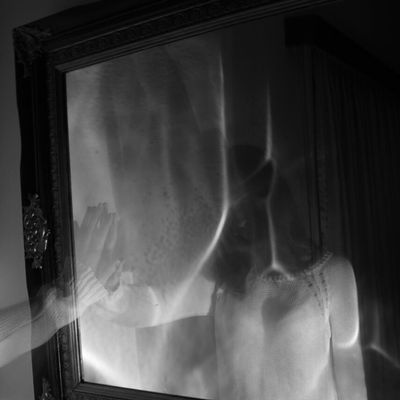
I don’t believe your ghost story. I mean, I’ll happily listen to it, and I’m genuinely interested in what you think you saw. But there’s no part of me that’s seriously considering that it might be the story to shift my resolve — to upend my understanding of everything from philosophy to physics. Your story about an unearthly black dog or a benevolent poltergeist may entertain me or even give me a chill. It may tell me something about you: your anxieties, your belief system, your perspective. It may provide me the challenge of working out, Dana Scully-style, a rational explanation — and by “rational,” I mean one that fits in with my understanding of the world. At no point, though, am I actually open to the idea that spirits are real.
This Halloween, however, I’m finding personal accounts of supernatural encounters pretty scary. Not because I see them as any more credible than I did before, but because, for the first time, I’ve realized that the way I respond to ghost stories is the same way men respond to stories of harassment and abuse.
When someone tells me about a malign presence in their basement or Bloody Mary appearing in their bathroom mirror, I generally don’t think I’m being lied to. I understand that the teller is sharing something they find deeply distressing and viscerally real. But I also think I know better. Their explanation goes against everything I know about the world. I’ve never experienced anything like it, so I have no reason to take their word over my own intuition.
This is the same rationale that fuels widespread dismissal of harassment, pressure, threat, abuse, and assault. It’s not that men (and also, to be fair, women who are committed to the status quo) think the women reporting these things are liars. It’s just that they think they know better. They believe that you think you experienced harassment, just like I believe that you think you saw a ghost. But just as I’m privately assuming it was probably sleep paralysis or just the house settling, men are privately — and sometimes publicly — positing that it must have been a misinterpreted compliment, or oversensitivity, or wishful thinking, or a tendency to take offense. Are we sure the rules weren’t different then? Are we sure she wasn’t just trying to boost her career? Are we sure that was even his hand?
These explanations — that a woman must have been sending confusing signals, or flattering herself, or even just regretted it afterward — are comforting, in the way that my rational explanations of supposed supernatural events are comforting to me. My skepticism reassures me that I’m not surrounded by forces more sinister than I’m willing to understand. It attests that my frameworks of science and spirituality remain intact; that I don’t have to start from scratch. They confirm that I am not at risk of seeing a ghost or becoming one. It makes sense to want these assurances — but only if they’re true.
The consequences of me not believing in ghosts are fairly minor. Despite my belief that the Dear David story is bunk, for example, the author is still out there tweeting and sharing his story. Dear David has not, to the best of my knowledge, been emboldened or enabled by my skepticism. But our collective inability to truly believe in rape and harassment stories — choosing, instead, to think that there must be another explanation that more closely tracks with our experiences and worldview — truly does allow evil to float around unchecked. This bone-deep skepticism, this unwillingness to consider that it might be our model of reality that’s wrong, is what allows people to grin nervously, shrug, look away, or even enable abusers. It’s Walter Peck barging into Ghostbuster headquarters and turning off the protection grid.
We seem to be in a period in which people are, at least briefly, taking harassment and assault stories seriously — though we’ve also seemed to be in that period before. Nothing is really going to change unless men as a whole realize that what they’re hearing now is not an unusually eerie, unusually plausible set of the same old campfire tales. This is the paradigm shift, the risky test, the proof. It’s a signal (the most recent of many) that their cosmology was wrong all along. It’s time to look in the mirror, say “Bloody Mary” three times, and reckon with who’s really there.




